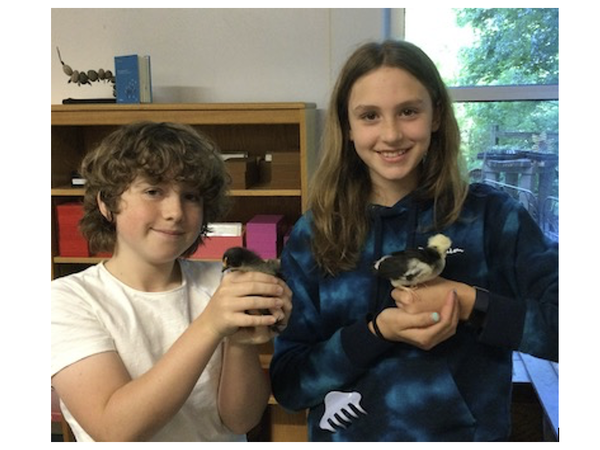News
News
On the Farm: Spring Chickens!

As if gardening wasn't enough, our animal friends also remind us that the growing season is here! We have some new and some "coming soon" additions to our campus barnyard and the backyard farms of some Springmont families!
Every year, I am asked by students, "When are we getting chicks in our classroom?" Their persistence invariably pays off because I am a pushover when it comes to children and soft, fluffy chicks! This year is no exception, and for the last four weeks, Ellen and Patricia's Elementary classes have been taking care of chicks. Once fully grown, they will go to a couple of Springmont families to join their backyard flocks.
Meanwhile, Middle School students incubated eggs in their classroom, and through the process of candling, they watched the lightning-fast development of a chick embryo happen before their very eyes. It is a miraculous process, one that mimics the embryonic development of many other species, including humans! Out of six eggs, we had two successfully hatch, and they are now being raised in Nathalie's Upper Elementary class.
Not to be outdone, Jenny, our turkey hen, has started sitting on her clutch of thirteen eggs! Turkeys are quite different from chickens in that they only lay one clutch of eggs per year, while chickens lay all year round, some almost daily. When she has laid all her eggs, a turkey then sits on them for twenty-eight days (as opposed to chickens which hatch in twenty-one days). While unlikely that all thirteen will hatch, we are hopeful that a few will and that Jenny will be a more diligent mom this time around! (If you have read The Tale of Jemima Puddleduck by Beatrix Potter, you will understand when I say that Jenny is a lot like Jemima!)
Allowing students to raise chicks in their classrooms and being able to watch animals raise their own young promotes empathy and compassion in students. It also encourages students to think beyond their own needs and fosters a deep sense of accomplishment as the young thrive.
Maria Montessori was passionate about exposing children to nature and having animals in classrooms. Caring for and being responsible for animals is a cornerstone of a Montessori education, and the different animals on Springmont's campus fulfill children's deepest desire to care for living things.
"Children have an anxious concern for living beings, and the satisfaction of this instinct fills them with delight. It is therefore easy to interest them in taking care of plants and especially of animals." – Maria Montessori


today
1 day ago